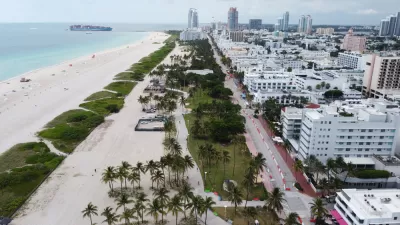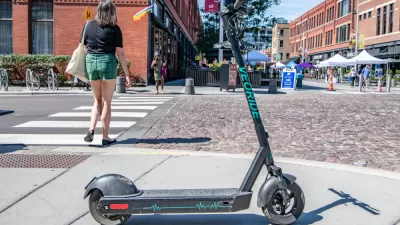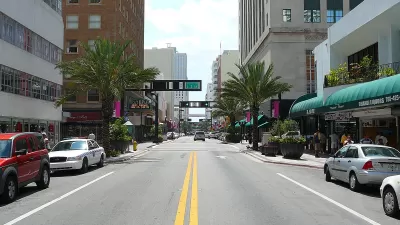After abruptly ending its shared e-scooter program last month, Miami is letting the devices return to its streets–with some new rules.

After ending its micromobility program on November 18, the Miami City Commission will reinstate the city's e-scooter program––with added safety requirements, reports Jason Plautz.
Supporters have touted scooters as an effective way to beat traffic in one of the country's most congested cities. However, their presence has long been controversial. Miami officials have pulled them several times even while managing the pilot, including during the COVID-19 pandemic and for a brief period in early 2021 over clutter concerns.
The city allowed scooter operators to return their devices to the street until at least after the holiday season, when the Commission will revisit the pilot program and potentially revise its regulations. While some commissioners view the scooters as a nuisance and sidewalk clutter, others believe the devices provide an important transportation option and a lucrative source of funding for protected bike lanes and other infrastructure. Others support the devices but want to see broader distribution to more neighborhoods, not just downtown areas popular with tourists.
The new rules require riders to wear helmets and reduce the number of scooters allowed per block. In the future, the city may institute speed regulations and shorter operating hours, according to Plautz. Earlier this year, Bird introduced 'Community Safety Zones,' high-activity areas where the devices automatically slow down, to improve safety and reduce the chance of scooter-pedestrian crashes.
FULL STORY: Miami set to temporarily restore scooters after ending pilot program

Planetizen Federal Action Tracker
A weekly monitor of how Trump’s orders and actions are impacting planners and planning in America.

Maui's Vacation Rental Debate Turns Ugly
Verbal attacks, misinformation campaigns and fistfights plague a high-stakes debate to convert thousands of vacation rentals into long-term housing.

San Francisco Suspends Traffic Calming Amidst Record Deaths
Citing “a challenging fiscal landscape,” the city will cease the program on the heels of 42 traffic deaths, including 24 pedestrians.

Defunct Pittsburgh Power Plant to Become Residential Tower
A decommissioned steam heat plant will be redeveloped into almost 100 affordable housing units.

Trump Prompts Restructuring of Transportation Research Board in “Unprecedented Overreach”
The TRB has eliminated more than half of its committees including those focused on climate, equity, and cities.

Amtrak Rolls Out New Orleans to Alabama “Mardi Gras” Train
The new service will operate morning and evening departures between Mobile and New Orleans.
Urban Design for Planners 1: Software Tools
This six-course series explores essential urban design concepts using open source software and equips planners with the tools they need to participate fully in the urban design process.
Planning for Universal Design
Learn the tools for implementing Universal Design in planning regulations.
Heyer Gruel & Associates PA
JM Goldson LLC
Custer County Colorado
City of Camden Redevelopment Agency
City of Astoria
Transportation Research & Education Center (TREC) at Portland State University
Jefferson Parish Government
Camden Redevelopment Agency
City of Claremont





























